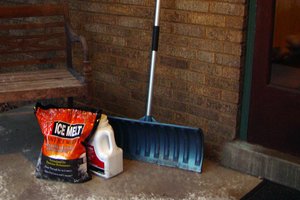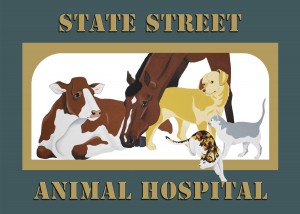It’s Coming!!! Winter. Whether you love it or hate it, you will want to take note of some important cold weather tips to protect the pet you love. Check this site for your weekly tip, and today’s tip is…..Ice melt. Ice and snow are a hazard and all of us want to prevent  accidents.
accidents.
Calcium chloride ice melt is one of the most common formulas sprinkled on the sidewalk, and rock salt is spread on the roads. Both of these can cause irritation to the skin, paws and gastrointestinal system.
Spread these products sparingly—you need to be safe, but excess amounts waste your money and hurt your dogs paws. Pet safe formulas are available on the market. We also recommend wiping your pets feet when they return from walks can minimize paw irritation and ingestion of the salts as they lick their feet.
At State Street Animal Hospital, PC we seek to help you prevent problems.
Does your dog spend his days in a barn, kennel or outdoor run? If so this message is for you.
Wintertime brings some important considerations. Outdoor dogs (and cats) need more calories in cold weather because their bodies need more fuel to stay warm. While many animals, if used to being outdoors, can adapt to the cold, wind and water can undermine their defenses.
A healthy coat provides some insulation as long as the wind in not cutting through its fluffy layers. Wet fur on the other hand provides little insulation, and helps chill your pet. Make sure your pet has adequate shelter, protection from wind and rain/snow, and clean bedding.
Finally, dehydration is as big a concern in cold weather as it is in hot weather. Water dishes (unless heated) often freeze and snow is not an adequate substitute. Make sure your pet has access to fresh water.
Antifreeze (Ethylene glycol)—It’s important to keep your car running in winter and cool in summer—it’s also VERY TOXIC to pets. Unfortunately it is also sweet to the taste and pets may try to consume spills. Some windshield washes even contain a little antifreeze. If your pet consumes even a little antifreeze it is CRITICAL to deal with the poisoning immediately!!! Antifreeze toxicity can be counteracted within the first few hours after it is consumed, but after 12-24 hours the damage is done and the resulting kidney failure is frequently fatal. If your pet consumes this poison get help before they act sick and before it’s too late! Better yet, keep the antifreeze safely stored out of your pet’s reach, check your car for leaks, and keep your pet away from the area that you do any car maintenance work.
At State Street Animal Hospital, PC we prefer to prevent problems when we can.
(There is a safer alternative antifreeze, Propylene glycol, it’s available but it may not be good for all cars—check with your mechanic)
Did you know your dog’s sense of smell is 40 to 100 times better than your own! Dog’s seem particularly capable of smelling food gifts and chocolate—even when they are wrapped in cellophane and wrapping paper! Chocolate, if eaten in large enough quantity (depending on the size of the pet) can cause anything from vomiting and diarrhea to seizures. Salty, fatty treats can cause pancreatitis and other significant digestive problems. Think ahead and keep those tempting presents, even if wrapped, out of reach of your pet so you can all enjoy a safe and happy holiday. The Staff and Doctors at State Street Animal Hospital, PC wish you a happy healthy holiday.
Your pet ate WHAT? If only you called me sooner! How often I want to say this, but I don’t want my client to feel worse than they already do. Many people think that when a poison is consumed their pet will fall over frothing at the mouth in the first hour. While this can happen, it is rare. Many poisons take hours or days to show their evil effects. Antifreeze toxicity shows few signs in the first few hours after consumption, but during this time can be counteracted. After 12 hours the poisoning is almost irreversible, and will cause severe, usually fatal kidney failure. Rat poison may not show symptoms for several days, but once the severe anemia and bruising are obvious can be expensive to treat. Both of these examples are important because if we know a pet has gotten into these substances right away we can reverse or prevent problems saving both lives and money. If your pet consumes something it shouldn’t, PLEASE, don’t wait. Call your Veterinarian or the Animal Poison Control Center (888-426-4435, www.aspca.org/apcc).
 accidents.
accidents.











Social